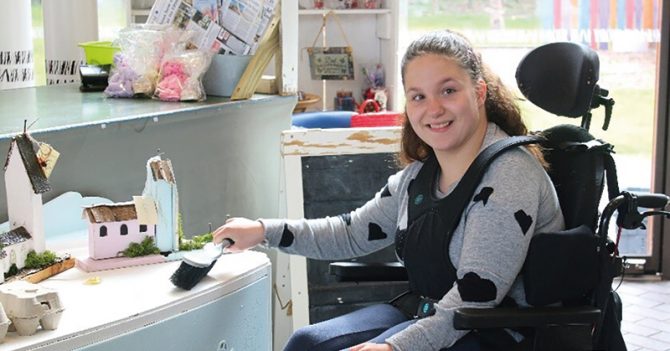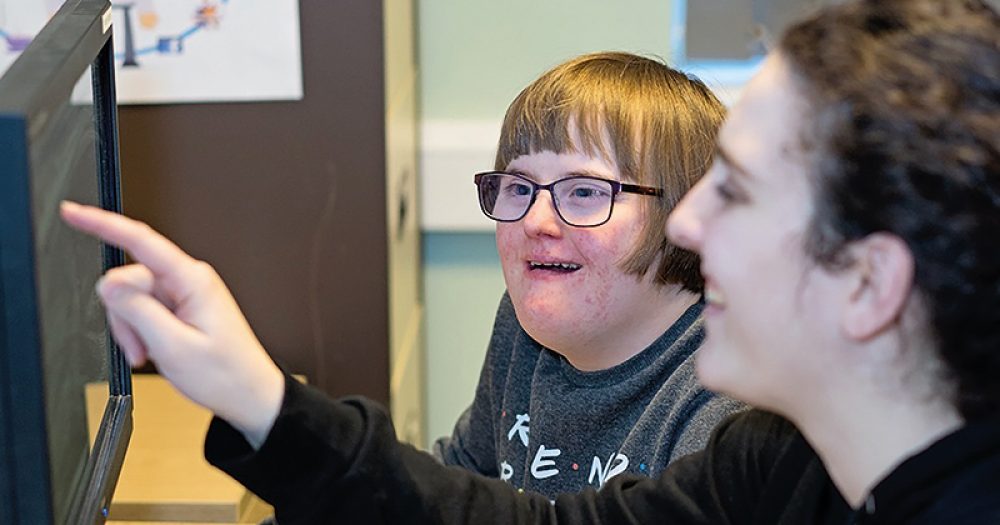FE Week has spoken to a number of specialist colleges to uncover the impact the Covid-19 crisis is having on the country’s most vulnerable learners, many of whom are residential and have “complex needs”, and found the extraordinary efforts staff are putting in to keep provision going…
“Try to envisage not being able to easily verbally communicate, having significant physical disabilities, profound and multiple learning disabilities, struggling with sensory overload or not being able to manage changes in your world.
“Add in Covid-19, mixed guidance, public panic and the potential removal of one of the safest environments you know… and you are a little closer to understanding how many of our students must be feeling.”
That’s how Adrian Sugden, principal of Henshaws College in Harrogate, sums it up for his day and residential learners, aged 16 to 25 and with a variety of complex needs.
However, it is not just students who have had to come to terms with Covid-19: Sugden says senior leaders and staff were “rocked” by the government’s decision to keep education settings open for vulnerable learners.
Specialist colleges were initially asked to stay open for all students with education, health and care plans, which would apply to their entire cohort, says Clare Howard, chief executive of specialist post-16 provider organisation Natspec.
As that “seemed inconsistent” with the social distancing guidance, Natspec worked with the Department for Education and now only those learners who cannot safely be provided for at home should still attend college.
“We are a very small cog in a great national effort and we will keep turning.”
Sugden says his staff now agree specialist settings should stay open as: “It was about supporting the NHS and providing the safest environment we could for our learners.
“We have done everything we can, in these challenging times, to maintain that.”
However, it is becoming increasingly difficult, as they are losing staff to self-isolation, childcare, family care and illness.
Henshaws, along with the other specialist providers FE Week spoke with, are not furloughing or laying off any staff – the college has even re-employed ex-staff.
The college will remain open over Easter, and expects around ten per cent of the total cohort of 97 to attend – the students who are full time residents or whose families are key workers.
“The challenge,” Sugden says, “will be maintaining a strong staff cohort when Covid-19 fully hits our region”.
Portland College near Mansfield, meanwhile, is taking on even more young people, as it is set to run a “holiday club” for a small number of them, at the request of the local authority, over Easter.
It is currently supporting up to 20 learners and five day-service users, about ten per cent of its usual cohort, as well as 25 in residential provision, around 80 per cent of that cohort.
It’s all “part of the national effort,” says principal Mark Dale. But it does not hurt that the college sits on 32 acres of Sherwood Forest and includes a fully wheelchair-accessible Woodland Adventure Zone.
He said they are treating the whole campus as an isolation “household unit”, so “we have strict policies in place regarding who can access the site during the lockdown period,” he said.
Learners who attend on a daily basis are supported in separate areas with separate staff to residential learners.

Yet Portland too is not without troubles: delays in delivering supplies have led to staff making face shields for their colleagues.
Another problem is funding: as a charity, the crisis is taking a bite out of their fundraising abilities and commercial operations. It was reported earlier this week the Covid-19 pandemic will mean charities will lose around £4 billion in the next financial quarter.
Funding is an “ongoing concern” for the sector, said Howard, as is securing food, cleaning products and personal protective equipment.
For many specialist colleges, a “significant proportion” of income comes from non-education budgets, and Howard says there is “question mark” over whether these sources will be guaranteed.
What adds extra impetus was the fact, she said, “for a small number of students, college is their home for 52 weeks a year; there is no other to send them back to”.
Dale said this was “uncharted territory” and it was “difficult to know” what their long-term future held.
“For now our focus is the health and wellbeing of our learners, residents and staff.”
This can-do spirit exhibited by Sugden and Dale can also be seen at National Star College in Gloucestershire, where chief executive David Ellis says staff “have gone above and beyond at this very challenging and difficult time” by keeping in touch with students at home and providing education and therapy resources for their families.
While there are currently about 33 residential and day students and 29 long-term residents in attendance, National Star will still provide respite care for an additional 17 students over Easter.
And out of a total cohort of 142 at Linkage College in Lincolnshire, around 20 of its 16 to 25-year-old learners have continued to attend. One of its campuses will remain open over Easter for three learners whose parents are key workers.
“We are fortunate to have a relationship manager at the Education and Skills Funding Agency, who has kept in regular contact and confirmed we will receive normal funding, in line with our payment schedule,” a spokesperson said.
But specialist providers also rely on funding from local authorities, and that is proving more troublesome for Linkage.
Its location means it is commissioned by seven authorities and there is no consistency in the paperwork being sent to providers, while the councils are expecting Linkage to complete all the administration of this – which is hard when you have over 30 per cent of staff off work.
For learners who are staying home, Linkage is “working hard” to ensure they can engage in learning through hard-copy and electronic work packs, telephone tutorials and online academic and pastoral support.
Specialist learning is not easily moved online, Howard says, as much of it is based on experience and observation. But her members have been “creative” in devising ways to get around that, including using adaptive technology and online classes.
Perhaps their commitment is best summed up by Mark Dale: “We are a very small cog in a great national effort and we will keep turning.”









Your thoughts